When it comes to pool maintenance and readiness for the chill winter months, selecting the right type of pool cover can make all the difference. Homeowners seeking to determine the best pool cover for winter must weigh the benefits of solid vs mesh pool covers. Solid covers are adept at blocking debris and sunlight, vital for maintaining clear water, they do, however, require a water pump and bring a heftier price tag. On the other hand, mesh pool covers, while lighter and more budget-friendly, may leave you with more to clean up when it reopens due to their permeable nature. Understanding the advantages of each and knowing how to choose pool cover based on your specific pool setup, climate, and usage is essential for optimal pool preservation.
To aid in the crucial decision of pool cover types, this article will explore the intricacies of the mesh vs solid pool cover debate, offering insights to keep your pool secure and clean throughout the off-season.
Key Takeaways
- Assess both solid and mesh pool covers to choose the best winter protection.
- Determine the best cover by factoring in your local climate and usage needs.
- Solid pool covers are excellent for water cleanliness but demand extra maintenance, such as a water pump.
- Mesh pool covers offer ease of handling and longer lifespan at the expense of potential spring clean-up efforts.
- Choosing the right pool cover goes beyond price; consider long-term benefits and pool safety.
The Importance of Quality Pool Covers for Safety and Maintenance
When it comes to safeguarding your swimming pool, incorporating the use of a high-quality pool cover is not just an accessory, but a necessity. The benefits of deploying a swimming pool safety cover span from protective to economic dimensions, influencing both the safety of your family and the longevity of the pool. Understanding the importance of this addition will guide you through a meticulous pool cover buying guide to secure the best protection for your oasis.
Why Invest in a Pool Cover?
Investing in a swimming pool safety cover is a decision that pays dividends in peace of mind and reduced maintenance costs. They serve as a strategic layer of protection against unintended access, bolstering the safe enjoyment of your outdoor space. Particularly for families and pet owners, a safety cover is a critical component to prevent accidental dips by curious children or adventurous pets.
Key Benefits of Pool Covers
Examining pool cover benefits reveals a gamut of practical advantages:
- Safety Enhancement: A robust safety cover provides a physical barrier against accidental falls into the pool.
- Evaporation Reduction: Pool covers significantly diminish water loss, preserving water levels and leading to savings on water bills.
- Chemical Preservation: By shielding the pool from direct sunlight, covers help maintain the chemical balance of the water, cutting down on the need for frequent adjustments and replenishments.
- Debris Control: Keeping leaves, twigs, and other detritus out of the pool ensures a cleaner swimming environment and eases the burden on filtration systems.
Criteria for Selecting the Right Cover
Selecting the right pool cover entails a closer look at several crucial criteria, which influence not only the safety and maintenance but also the operational efficiency of your swimming pool. To navigate the pool cover buying guide effectively, it’s essential to factor in elements such as:
| Criterion | Description | Considerations |
|---|---|---|
| Pool Environment | The immediate surroundings of your pool, including tree cover and wind exposure. | Areas with high debris fall may require covers with solid panels or tighter mesh. |
| Usage Frequency | How often the pool is used across different seasons. | For pools used year-round, a durable and easy-to-remove cover is ideal. |
| Safety Concerns | The level of safety required to ensure peace of mind. | Homes with children or pets should prioritize covers with enhanced safety features. |
| Maintenance Preferences | The willingness and ability of the owner to manage pool maintenance. | Those looking for low-maintenance options might opt for automated covers. |
Ultimately, understanding these facets ensures that you select a cover that not only meets your pool’s safety standards but also aligns with your maintenance expectations and lifestyle. As you chart out this territory, a well-informed choice will result in an optimally protected and maintained swimming pool, anchoring the tranquility and enjoyment of your home.
Understanding the Types of Pool Covers Available
As a pool owner in South Africa, you’re faced with numerous options when selecting a cover to protect your investment. It’s crucial to understand the differences between mesh vs solid pool cover comparison, and why certain covers are considered top rated pool covers. Below, we explore the various types designed to cater to different needs—from safety to conservation.
Safety Covers: Mesh and Solid Options
Safety should always be a priority when it comes to swimming pools. Both mesh and solid safety covers are built to withstand the weight of pets and people, thereby reducing the risk of accidental drowning. To aid in your decision-making, a comparison of these two types is essential. While mesh covers are lighter and easier to handle, they can allow for debris and sunlight to pass through, possibly leading to algae buildup. On the other hand, solid covers offer superior clean water retention, though they often require a pump to remove excess water.
Solar Covers: Harnessing the Sun’s Energy
Solar covers, also known as solar blankets, should be on your radar if you’re looking to extend your swimming season without the added electricity cost. These covers utilize solar energy to warm the pool, which in addition to maintaining a comfortable temperature, also reduces chemical dissipation. Efficient in design, leading brands have become popular choices for those seeking environmentally-friendly and cost-effective solutions.
Winter Covers: Off-Season Protection
Especially relevant in regions experiencing cooler months, a winter cover is crucial for off-season pool protection. Designed to guard against harsh weather conditions and debris, these covers ensure that come spring, your pool requires less intensive maintenance before it’s ready for use. Exploring winter cover options–based on their durability and level of protection–is imperative when preparing your pool for the off-season period.
| Cover Type | Benefits | Consideration Factors |
|---|---|---|
| Mesh Safety Cover | Easier handling, allows water through, preventing puddling | May lead to algae, requires thorough spring cleaning |
| Solid Safety Cover | Limits algae growth by blocking sunlight, maintains water cleanliness | Requires pump for water removal, can be heavy |
| Solar Cover | Heats water using solar energy, reduces chemical loss | Not as durable as safety covers, may require frequent replacement |
| Winter Cover | Shields pool from debris and weather, reduces off-season maintenance | Must ensure proper fit and durability against the elements |
Comparing mesh vs solid pool cover comparison and considering the top rated pool covers available, it’s clear that the choice depends on individual requirements and preferences. Each cover type offers distinct benefits and should be evaluated for its suitability in the context of the South African climate and your specific pool environment. Mesh pool cover advantages include enhanced water drainage, reducing the risk of algae growth and keeping debris out of the pool, making maintenance easier. Additionally, these covers allow sunlight to penetrate, which can help to warm the pool naturally. On the other hand, solid covers provide superior protection against pool contaminants, making them ideal for areas with heavy rainfall or a lot of debris.
Solid vs Mesh Pool Cover Comparison: Weighing Your Options
Deciding on the right pool cover involves a solid vs mesh pool cover comparison to ensure that your pool remains protected while meeting your specific maintenance preferences. This section hones in on the unique features to consider when selecting a pool cover within the South African climate.
Advantages of Solid Pool Covers
- Complete blockage of sunlight prevents algae growth.
- Keeps pool water clean and reduces spring cleaning workload.
- Added security due to their durability and resistance to tearing.
Considerations for Solid Pool Covers
- Higher initial cost compared to mesh alternatives.
- Requires a pump to remove accumulated water, adding to maintenance efforts.
- Heavier and may need more than one person for handling and installation.
Advantages of Mesh Pool Covers
- Economical and more affordable in the short term.
- Allows water to seep through, eliminating the need for a pump.
- Lightweight design simplifies handling and storage requirements.
Considerations for Mesh Pool Covers
- Permits fine debris and sunlight to pass through, possibly leading to algae growth.
- Might require more extensive cleaning upon seasonal pool opening.
- Can be less effective in maintaining water cleanliness during the off-season.
The following table presents a solid vs mesh pool cover comparison, breaking down important decision factors side by side – helping you weigh your options effectively.
| Feature | Solid Pool Cover | Mesh Pool Cover |
|---|---|---|
| Sunlight Penetration | None | High |
| Water Accumulation | Requires Pumping | Self-Draining |
| Maintenance Level | Higher | Lower |
| Price Point | More Expensive | More Economical |
| Longevity | Varies by Material | Typically Longer Lasting |
| Cleaning Requirements | Lower | Higher |
| Installation & Handling | Multiple People Needed | Generally Easier |
In the mesh vs solid pool cover debate, homeowners must prioritize their needs, whether that’s pool cleanliness, maintenance convenience, or budget. Assessing each aspect attentively will guide you to the pool cover that aligns with your personal preferences and the demands of your pool’s environment.

Top-Rated Pool Covers and Their Features
When considering the diverse selection of pool cover types available in the market, discerning homeowners look for products that offer a blend of safety, efficiency, and long-term value. Among the pool cover brands that stand out for their quality and innovative designs, a few have earned the distinction of being top rated pool covers by experts and consumers alike. Selecting the best pool cover for winter, or any season, is an investment in your pool’s longevity and safety.
Loop-Loc, Meyco, and Coverstar: Brand Overview
Loop-Loc makes a strong impression with their hybrid covers, which ingeniously amalgamate the sturdiness of solid covers and the practicality of mesh covers. They’re specially designed to forgo the need for a pump, all the while decreasing sunlight exposure to mitigate algae growth. Meyco follows suit with its own set of reliable safety covers that are recognized for their robustness and pedigree. Meanwhile, Coverstar sets itself apart by integrating an automatic system that redefines simplicity, providing unparalleled convenience for pool owners who prioritize ease of use without compromising on safety or effectiveness.
Solar Pool Cover Reviews: Efficiency at Its Best
Transitioning our focus to solar pool covers, brands like Intex, Sun2Solar, and Blue Wave take the spotlight for their commitment to maximizing heat retention. These solar pool covers contribute to energy conservation thanks to their specialized designs aimed at trapping the sun’s warmth effectively. What’s more, they stand out as the best pool cover for winter, enabling pool owners to maintain warmer water temperatures even as the weather cools, reducing the need for additional heating resources.
